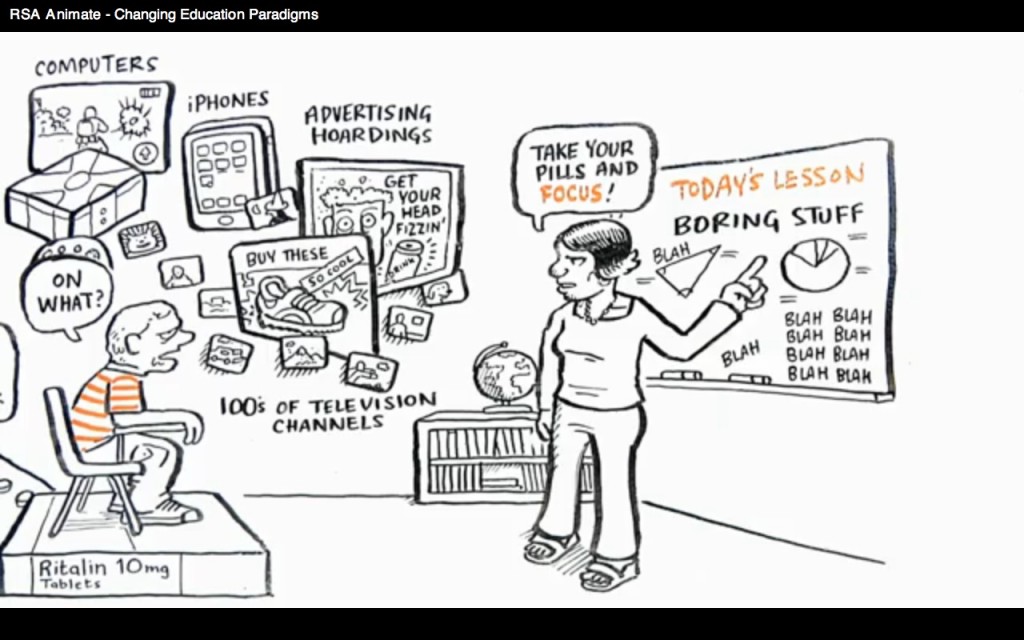The plot seems to thicken with the New Literacy Studies, especially as the binary relationship between orality and literacy is called in to question. Gee (1996) leads the way with his review of the development of the two-sided debate, including some familiar names like Havelock, Vygotsky, Ong and Heath. The old world view of educated civilization and illiterate savages was demonstrated not to be so appealing after Havelock proved Homer’s epics were most likely composed ages before anyone could read or write (at least anyone Greek had these valuable skills). Ong’s further praise of oral culture’s strengths, along the same argumentative lines as Plato, prove that more the word’s proper place was in the mouths of people, not on surfaces or even screens. Ong’s Orality and Literacy presents an intriguing case for secondary orality, which follows along the same lines as TEDtalks, RSA.org and even YouTube itself. Here is a link to animator Andrew Park discussion with RSA on link between the visual images and memory: The RSA Animate Revolution.
Perry (2012) covers the same ground, but with more questions about the difference between New Literacy studies and New Literacies. Kind of difficult to follow along without a map or flowchart, and she even includes diagrams in her paper. Many of her questions are answered, some with more questions to follow, all zeroing in on the big question, what is literacy? Much of the class seems to be pondering this very question, which is not so bad for literate minds like ourselves, but I really have to wonder if students in other graduate degree programs spend as much mental energy asking questions like “what is physics?”, “how do we define law?” or “what does ‘ocean’ mean?”. A paradigm must have something in view, however nebulous the abstract idea might be, and Perry puts her two-cents in with a subtle complaint that “something is lost when the field defines literacy so broadly” (p. 65). For other answers that Perry provides, they are directed towards multiple meaning and differing opinions, and I find her paper at a balancing point between Gee and Street.
Finally there is Street (2003) again, jazzing up the questions Perry would ask less than a decade later, but focusing on the newness of New Literacy Studies. If he himself and Gee take so much credit ushering in the new studies in the early 1990s, how new could they be by the start of the 21st century? I felt the same sense of unease as when I studied post-modern art for my undergraduate, wondering if there will be a point in art history where people look back at our period and say “ah, that po-mo movement, so dated. Thank goodness society moved on to…” While literacy seems to keep morphing its researchable shape, picking up new terms and dropping out-of-date concepts, one of my classmates last week raised an interesting point about the continual search of the new. Taking digital literacy as the newest of the new literacies, there will eventually be a point where society, led by dissatisfied academics, go into post-digital literacy. No doubt Google has its top thinkers working on a way to get their corporate logo put in front of whatever words are used to describe gliteracy.
Reference
Gee, J. P. (1996). Social linguistics and social literacy: Ideology in discourse. London: Taylor Francis. 46-65.
Perry, K. H. (2012). What is literacy? – A critical overview of sociocultural perspectives. Journal of Language & Literacy Education 8(1). 50-71.
Street, B. (2003). What’s “new” in new literacy studies? Critical approaches to theory and practices. Current Issues in Comparative Education 5(2). 77-91.

One Comment
Love the Ken Robinson short… I think I’ll use it in class! And yes, lots of pondering around what literacy is…. as you’ve likely already noticed in readings, both in this class and other classes, there is little agreement on the topic. Those in law may not ponder what is law, but they should certainly contemplate, what is justice? No easy answers there either, especially as you look across contexts and communities.
By the way, Street has recently renamed New Literacy Studies. He now, at least in conversation, simply refers to them as ‘Literacy Studies’ – clearly, he recognizes they are no longer new.